
Intelligent Document Processing: Capturing the Opportunity
April 9, 2024
Articles, Artificial Intelligence, Artificial Intelligence, Channel, Research, Trends
According to Quocirca’s Document Trends 2024 Study, a significant 63% of organisations are gearing up to increase their investment in intelligent document processing (IDP) within the next year. This number is even more pronounced in sectors such as business and professional services and finance, where the figures jump to 68% and 69%, respectively. IDP is becoming increasingly recognised as a powerful force in workflow automation, equipping organisations to adeptly navigate the complexities of managing and securing myriad enterprise document formats.
At the heart of digital transformation, IDP stands as a pivotal enabler, streamlining data extraction and processing to foster a more agile and responsive business environment. For print suppliers and channel partners, this technological evolution unlocks significant opportunities. It paves the way for them to diversify their offerings, enhance customer value, and secure a competitive edge in a landscape that’s increasingly shedding its reliance on paper.
How IDP can streamline workflows
Digital transformation relies in automating manually intensive document processes, as well as unlocking valuable insights from data. Today, it is estimated that over 80% of enterprise data resides in unstructured or semi-structured format – think business documents, emails, images, or PDFs. Managing these diverse data sources is costly and inefficient because of the high reliance on manually intensive tasks, which are often prone to error.
IDP solutions can automate processing for structured, semi-structured, and unstructured data. IDP leverages technologies such as artificial intelligence (AI), machine learning (ML), optical character recognition (OCR), and natural language processing (NLP) to scan, read, understand, extract, categorise, and organise information into accessible formats, creating ‘straight-through’ processing, where there is little to no need for human input. Robotic process automation (RPA) can be integrated with IDP to provide enhanced triggers that can set off actions based upon results of the analysis of IDP activity.
These capabilities translate into a smoother digital transformation journey. The combination of AI-enabled data intelligence and streamlined automation has a direct impact on operational efficiency, process accuracy, and costs, while also supporting better regulatory compliance and risk mitigation. More widely, IDP can also contribute to improved customer and employee experiences because of more streamlined communication and collaboration.
IDP and sustainability
Sustainability is a top factor for many organisations’ digitisation initiatives, with 31% of large enterprises reporting it as the most important business outcome.
IDP can also help organisations achieve sustainability goals and reduce environmental impact. It can support the transition to a ‘less-paper’ or paperless environment by automating processes and storing information digitally, which cuts down on paper production, transportation, and storage. This is in addition to the cost savings associated with reducing toner/ink and paper usage. Such digitisation in a more structured and searchable manner also helps meet vertical and legal information retrieval and disclosure standards.
Businesses can also leverage data unlocked from documents for sustainability-focused data analysis. This can be to analyse their environmental footprint and identify areas for improvement. For instance, by analysing energy bills, companies can pinpoint buildings with high energy consumption and use the findings to implement sustainable solutions.
Supplier recommendations
The IDP market is characterised by myriad suppliers covering a wide range of industries. IDP expertise will unlock a new revenue stream and strengthen partner-client relationships. Channel partners that embrace IDP can become trusted partners, helping businesses unlock the power of their data and achieve their digital transformation goals.
Partners can capitalise by offering:
- Solution implementation. Partners can help businesses implement and integrate IDP solutions with existing workflow and enterprise application systems.
- Cross–organisation implementations. Enabling straight-through workflows between organisations can massively improve efficiencies and effectiveness. Ensuring that data and information is handled in a common format across organisational boundaries is key.
- Customisation and training. Partners can offer customisation services to tailor IDP solutions to specific client needs and provide training to ensure user adoption.
- Managed services. Partners can provide ongoing support and maintenance for IDP deployments.
While the opportunity is significant, resellers must navigate challenges such as integrating IDP solutions with existing IT infrastructure and managing data privacy concerns. Staying abreast of regulatory compliance and offering solutions that meet these standards will be crucial for success.
However, the IDP market landscape is complex and fragmented, with a spectrum of solutions available – from point solutions through comprehensive platforms to those that are vertically focused. Buyers will be increasingly wary of solutions that are touted as IDP but are simply print management or workflow tools. Channel partners in the print sector should evaluate not only the broader market, but also traditional suppliers such as Xerox, Tungsten Automation, Kodak Alaris, and ABBYY, which are already well established in the IDP arena. Other IDP players include OpenText, Retarus, and UiPath. Channel partners that are heavily Microsoft focused may want to look at Microsoft Syntex, AI Builder, and Power Automate.
The print industry should capitalise on the ability of IDP to bridge physical and digital worlds to help remain relevant in the rapidly digitising environment. Alongside legal and vertical demands for more automated information flows, the maturation of sustainability initiatives and regulations will make the need for IDP both more important and more valuable.
Intelligent Document Processing: A Market Primer provides further insight into IDP and the print industry. Please contact Quocirca to find out more about our forthcoming IDP Vendor Landscape and how to participate.




